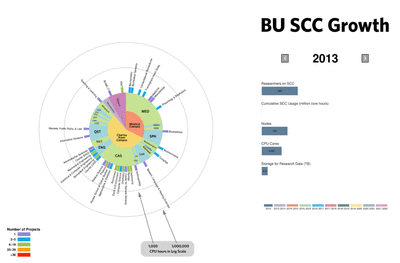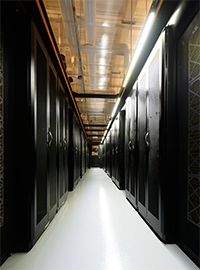Detailed slides of the SCC’s growth between June 2013 and June 2022 can be viewed at: rcs.bu.edu/PR/scc-growth/
The Boston University Shared Computing Cluster (SCC) is a heterogeneous Linux cluster composed of both Shared and Buy-in components. The system currently includes over 12,000 shared CPU cores, over 16,000 Buy-in CPU cores, 400 GPU, and 14 petabytes of storage for research data (approximately 92% of this is Buy-in storage).
The SCC is suitable for high-performance computing in a wide range of disciplines, from the physical sciences, engineering, biostatistics, public and global health, bioinformatics, genomics, neuroscience, and geographic information systems (GIS), to emerging computational communities such as machine learning, economics, finance, the social sciences, microbiology, and infectious diseases.
The SCC is located in Holyoke, MA, site of the LEED Platinum certified Massachusetts Green High Performance Computing Center (MGHPCC) where energy is plentiful, clean, and inexpensive. Two pairs of 10Gigabit Ethernet network connections between the MGHPCC and the BU campus provide extremely fast data transfer between the two locations.
The first components of the system were delivered to the MGHPCC in January, 2013 and went into production use on June 10, 2013. Over the summer of 2013, the newer parts of our prior Katana cluster as well as various departmental and buy-in nodes were integrated into the system, with the BUMC LinGA system being integrated shortly thereafter.
SCC Growth
Since its installation the SCC has grown immensely from 189 compute nodes in 2013 to 1056 nodes in 2025 with similar growth in researchers using it and storage. In the first twelve years, researchers on 1200 projects across 90 departments have done over 800 million hours of computation on the SCC! Much of this growth is a result of the extremely successful Buy-in Program, allowing researchers to acquire additional, standardized compute and storage resources to support their individual research projects.
SCC’s operating system is AlmaLinux 8. It was upgraded to this from CentOS 7.5 in August 2023.
Please consult our pages on SCC system usage for information for both beginners and experienced users on using the SCC.


